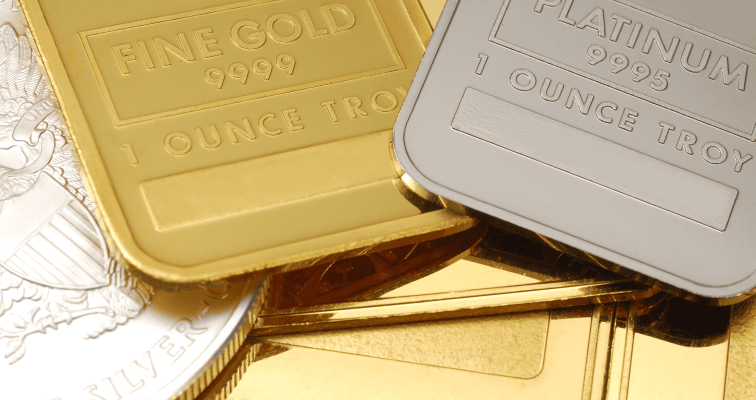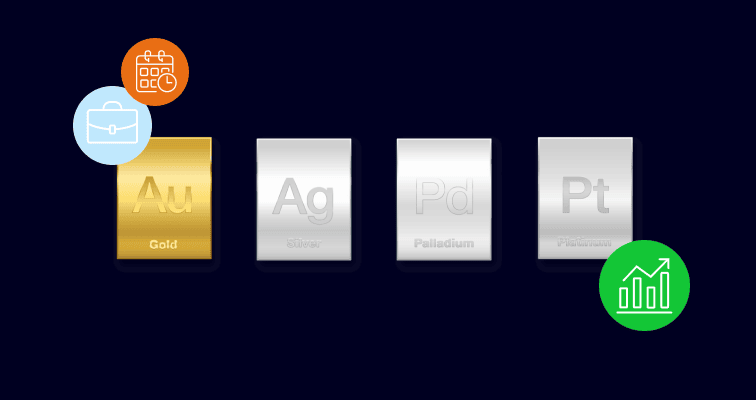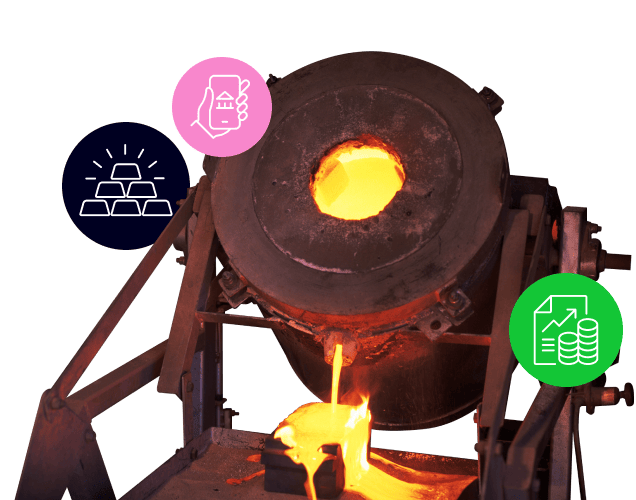It is essential to understand how the precious metals market operates and what drives prices. Learn about the different options available to those interested in investing in precious metals such as gold and silver.
Precious metals trading is one of the longest-standing methods for trying to make an investment return. The intrinsic value of gold and silver, which stems from their scarcity, has historically interested investors, while other rare metals, such as platinum and palladium, are now also being widely traded.

How to invest in precious metals
Most investors buy precious metals because of their capacity to act as a store of wealth and as a hedge against risks such as inflation. There are various financial instruments available to those looking to start investing in precious metals, so new and experienced investors should be able to find an option that suits their preferences and trading strategy.
Precious metals stocks and shares
Companies that operate in the precious metals mining and extraction sector have share prices that often align with the value of the specific metal they specialise in. For example, buying stocks in mining companies such as Anglo American and AngloGold Ashanti can present a convenient and cost-effective way to start gaining exposure to the precious metals market, without investing in the commodity itself.
This correlation between the commodity and stock price can vary from company to company and will likely change over time.
Tip: Studying a company’s investor reports can help you to establish which precious metals they specialise in.
ETFs and mutual funds
Exchange-traded funds (ETFs) and mutual funds can allow investors to buy a basket of assets linked to the precious metals sector. This could be a good potential option for beginner investors looking to diversify their exposure to precious metals.
The average expense ratio for an equity ETF is less than that of a mutual fund, making the former a cheaper option for trading and holding. This cost discrepancy is due to the fact that ETFs are “passive,” meaning that they track the market, whereas mutual funds involve managers who adopt a more active approach to try and outperform the wider market.
Precious metals futures
Precious metal futures are traded on specialised commodity exchanges and are widely considered to be the heart of the market; many precious metal instruments base their price reporting on data from futures exchanges.
However, futures trading can be a fairly technical process making it unsuitable for beginners.
Direct physical investment
Precious metals are tangible, transportable and relatively easy to store. With that in mind, some investors prefer to invest in the physical asset, despite the additional risk of loss or theft.

Investing in gold and silver
Gold and silver are the two most actively traded precious metals. Combined, they account for almost 20% of all global commodity trading activity. Silver is more widely used in industrial production, owing to its unique properties that make it an ideal raw material for tech devices and solar panels. On the other hand, gold is typically bought by investors as a hedge against inflation or geopolitical risk.
Because of their popularity, there are several options available to investors interested in investing in gold or silver. All of the instruments mentioned above, including commodity stocks, ETFs and futures, can all be used to invest in these precious metals. Physical investment in silver or gold is also a particularly popular choice for investors.
Below are some specific examples for investors interested in investing in gold or silver:
| Stocks | Gold | Alamos Gold Inc. |
| Silver | First Majestic Silver Corp. | |
| ETFs | Gold | SPDR Gold |
| Silver | iShares Silver Trust |
Other precious metal investments
Other precious metals can also be traded using a variety of financial instruments. For example, investors interested in platinum might consider investing in platinum mining stocks, such as Sibanye Stillwater, or purchasing a CFD that tracks the price of platinum futures.
Palladium is another precious metal that can be invested in. The majority of the world’s palladium is sourced from Russia, South Africa and Canada. It is primarily used in the production of catalytic converters for vehicles, but it is also used in jewellery production. Consider investing in a palladium CFD or the Abrdn Palladium ETF Trust to gain exposure to this precious metal.
Tip: Palladium is more than 30 times rarer than gold, but gold still has a higher cost per ounce.

Final thoughts
Investing in precious metals can help to offset the risks associated with investing in mainstream assets such as stocks or bonds. The precious metals market tends to exhibit a negative correlation with these assets, which can help investors to create a balanced portfolio with lower overall risk and potentially more consistent returns. This can help to facilitate streamlined portfolio management, which is essential when striving to attain financial freedom.
Visit the eToro Academy to learn about gold, silver and other commodities.
Quiz
FAQs
- What are base metals?
-
Beyond precious metals, there exists a realm of non-precious metals, often referred to as base metals. These are also traded on exchanges, and the price fluctuations within the copper, nickel, zinc, aluminium and lead markets are closely tied to the global economy. Unlike their precious counterparts, these metals are not commonly used to store wealth.
- Why do some investors hold gold in physical form?
-
Despite the risks associated with it, some investors prefer to hold gold in a physical form. Some investors believe that in the event of a severe global financial crisis, in which the price of gold skyrockets, conventional holdings in stocks, ETFs and futures could potentially become vulnerable. Should such a market meltdown arise, having bullion at home would give the holder a greater degree of control.
- During which hours are precious metals traded?
-
Precious metals trading hours will depend almost entirely on your broker. Some brokers will provide round-the-clock markets in precious metals during weekdays, meaning you can trade precious metals 24/5.
This information is for educational purposes only and should not be taken as investment advice, personal recommendation, or an offer of, or solicitation to, buy or sell any financial instruments.
This material has been prepared without regard to any particular investment objectives or financial situation and has not been prepared in accordance with the legal and regulatory requirements to promote independent research. Not all of the financial instruments and services referred to are offered by eToro and any references to past performance of a financial instrument, index, or a packaged investment product are not, and should not be taken as, a reliable indicator of future results.
eToro makes no representation and assumes no liability as to the accuracy or completeness of the content of this guide. Make sure you understand the risks involved in trading before committing any capital. Never risk more than you are prepared to lose.


